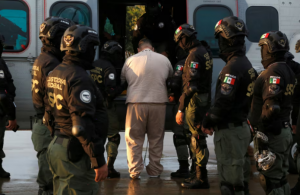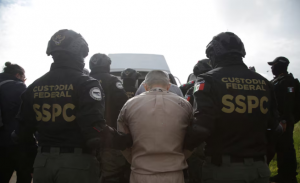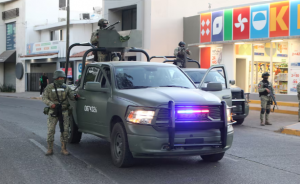
Photo credit: U.S. Immigration and Customs Enforcement, used for illustrative purposes
| Published August 18, 2025
In a dramatic escalation of U.S.–Mexico law-enforcement cooperation, Mexico extradited 26 individuals accused of drug-trafficking ties to the United States on August 12, 2025—a second major transfer this year triggered by intensifying pressure from the Trump administration.
The Extradition Details
The August 12 transfer was one of the most high-profile security operations Mexico has carried out this year. In a carefully coordinated mission, federal security forces moved 26 imprisoned suspects from the country’s high-security penitentiaries to Toluca International Airport, where they were handed over to U.S. authorities. From there, the accused traffickers were flown north to face trial in American courts.
The extradited individuals include men tied to some of Mexico’s most powerful and violent organizations—the Jalisco New Generation Cartel (CJNG) and the Sinaloa Cartel—both of which dominate much of the fentanyl, cocaine, and methamphetamine trade flowing into the United States. According to Mexican officials, all 26 had been subject to outstanding U.S. indictments and were sought by the Department of Justice (DOJ).
In their joint statement, Mexico’s Attorney General’s Office and the Ministry of Security stressed that the handovers were conducted under strict legal protocols. Crucially, Washington provided assurances that none of the suspects would face the death penalty, a long-standing condition for extraditions from Mexico given its constitutional ban on capital punishment. These guarantees are necessary for Mexico to maintain legal and political legitimacy at home while cooperating with the U.S.
This was not an isolated case. Just six months earlier, in February, Mexico extradited 29 cartel figures in one swoop, among them Rafael Caro Quintero, the infamous drug lord once convicted of orchestrating the 1985 murder of DEA agent Enrique “Kiki” Camarena. The two transfers combined mean that 55 cartel suspects have been extradited to the U.S. in 2025 alone—a scale not seen in decades.
The logistical challenges of these operations are immense. Moving so many high-risk detainees at once requires hundreds of federal police and military personnel, armored convoys, and air support to guard against potential cartel rescue attempts. Each extradition flight is treated as a national security mission, underscoring the gravity of the handovers.
For the U.S., the transfers represent a significant victory in efforts to curb the flow of fentanyl and other narcotics fueling America’s overdose crisis. For Mexico, they are meant to show commitment to bilateral cooperation—but they also risk exposing the country to reprisals from cartels angered by the loss of their leaders.
Pressure from Washington
The August 12 extraditions cannot be understood in isolation—they are the product of mounting pressure from the Trump administration, which has woven cartel crackdowns into the fabric of U.S. national security, trade, and immigration policy.
President Trump has framed Mexican cartels not merely as criminal enterprises but as terrorist organizations, opening the door for the Pentagon to draft operational plans targeting them much like foreign insurgent groups. The message to Mexico has been unmistakable: cooperation is not optional.
To drive the point home, Trump has wielded one of his sharpest tools—economic leverage. By threatening new tariffs on Mexican exports, he has tied the fight against cartels directly to trade. For a country where nearly 80% of exports head north across the U.S. border, the risk is existential. Trump’s strategy recalls earlier moments in his presidency, when tariff threats forced Mexico to strengthen immigration enforcement to curb migrant flows. Now, the same hard-edge tactic is being applied to drug enforcement.
Beyond tariffs, Washington has deployed a range of diplomatic and financial pressures:
-
Visa restrictions targeting Mexican officials suspected of cartel ties.
-
Increased DEA and DOJ requests for extraditions, with the U.S. insisting that suspects face trial in American courts.
-
Expanded intelligence operations, with U.S. agencies demanding deeper access to Mexican data on cartel movements and financial networks.
The strategy is both a carrot and a stick. On one side, Trump has offered closer bilateral cooperation through a new security pact under negotiation, promising resources and coordination. On the other, he has made clear that Mexico risks economic punishment, reputational damage, and even the specter of unilateral U.S. military action if it refuses to comply.
This multifront pressure campaign has put Mexico in a difficult spot—forcing President Sheinbaum’s administration to show it can be a reliable partner without appearing subservient. The extradition of 26 cartel suspects was not simply a law-enforcement move; it was a calculated political act to buy time, ease pressure, and preserve trade stability while negotiations continue.
Mexico’s Tense Balancing Act
For Mexico, the extraditions represent far more than routine judicial cooperation—they highlight the delicate balancing act President Claudia Sheinbaum must maintain between appeasing U.S. demands and defending her country’s sovereignty.
On one hand, the transfers demonstrate Mexico’s willingness to respond to Washington’s mounting pressure. The United States is its largest trading partner, and Trump has openly tied cartel suppression to economic policy—using tariff threats as leverage. By extraditing dozens of cartel suspects, Sheinbaum signals that her administration is committed to tackling organized crime and preserving bilateral stability, even as her domestic critics warn she risks being seen as capitulating to U.S. dictates.
On the other hand, Sheinbaum has drawn a firm red line: no U.S. military boots on Mexican soil. Trump’s order for the Pentagon to prepare operations against cartels—classified as “terrorist organizations” by Washington—has reignited a longstanding sensitivity in Mexico about foreign intervention. In public statements, Sheinbaum has framed the extraditions as serving Mexico’s own security interests, carefully avoiding the perception that her government is simply acting under U.S. orders.
Meanwhile, negotiations are underway for a new bilateral security agreement, one that could replace ad-hoc measures with a more formal framework for intelligence-sharing, joint investigations, and law-enforcement training. This may strengthen cooperation while allowing Mexico to preserve at least a semblance of autonomy.
Still, the balancing act is precarious. Too much cooperation risks stirring nationalist backlash at home, while too much resistance could provoke economic retaliation from Washington. The result is a strategy that seeks to demonstrate strength to both audiences—reassuring the U.S. of Mexico’s commitment to combating cartels while assuring Mexicans that their sovereignty remains intact.

Members of Mexico’s federal forces escort a prisoner wanted in the U.S. for ties to drug-trafficking groups at the Altiplano high-security prison, before transferring them to Toluca International Airport, amid pressure from U.S. President Donald Trump to dismantle drug cartels, in Almoloya de Juarez, Mexico, August 12, 2025. Gabinete de Seguridad de Mexico/Handout via REUTERS

Members of Mexico’s federal forces escort prisoners wanted in the U.S. for ties to drug-trafficking groups into a plane, amid rising pressure from U.S. President Donald Trump on Mexico to dismantle the country’s drug organizations, at the Toluca International Airport, in San Pedro Totoltepec, Mexico, August 12, 2025. Gabinete de Seguridad de Mexico/Handout via REUTERS

Members of the Mexican Army stand guard in the area where two members of a faction of the Sinaloa Cartel were detained during an operation by Mexican federal authorities, in Culiacan, Mexico, February 19, 2025. REUTERS/Jesus Bustamante/File Photo
 Implications
Implications
The implications of these cartel extraditions and the Trump administration’s pressure on Mexico:
1. U.S.–Mexico Relations
-
Strained but cooperative:
Mexico’s government under President Claudia Sheinbaum is walking a fine line—showing cooperation by extraditing cartel figures, while pushing back against U.S. talk of unilateral military action. -
Trade and security linkage:
Trump’s tariff threats make security cooperation part of trade negotiations, meaning Mexico risks economic pain if it doesn’t comply. This could redefine the U.S.–Mexico partnership from mutual security to pressure-driven compliance.
2. Cartel Operations
-
Leadership disruption (short term):
Removing mid-to-high level cartel leaders may temporarily weaken cartel command structures. -
Rapid replacements (long term):
Historically, extraditions and arrests often lead to fragmentation rather than dismantling cartels, creating smaller, more violent splinter groups. -
Cross-border impact:
With U.S. courts handling these cases, cartels face greater legal risks, but they may retaliate with escalated violence in Mexico.
3. Domestic Politics in Mexico
-
Pressure on politicians:
The U.S. is not only targeting cartels but also politicians suspected of ties (e.g., visa cancellations, investigations). This could expose corruption networks but may also be seen as U.S. interference in Mexico’s internal affairs. -
Sheinbaum’s challenge:
She risks being seen as too submissive to Washington if extraditions continue at this scale, potentially hurting her political base.
4. U.S. Domestic Politics
-
Trump’s leverage:
By forcing extraditions, Trump shows voters that he’s “tough on cartels”, linking border security, drug trafficking, and immigration to his broader agenda. -
Precedent setting:
If Trump can push Mexico this far, future administrations may adopt similar coercive diplomacy—using trade and visa tools against allies.
5. Security & Legal Implications
-
Fentanyl & drug flow:
These moves aim to curb fentanyl and meth trafficking into the U.S. However, experts warn cartel networks are resilient and may adapt supply chains quickly. -
Legal diplomacy:
Mexico only agrees to extradite under the condition that death penalties won’t be pursued. This highlights ongoing friction over sovereignty and U.S. justice practices.
6. Broader Geopolitical Signal
-
Message to other countries:
Trump’s strategy shows the U.S. is willing to weaponize trade, visas, and sanctions to force compliance—not just with Mexico but potentially with other nations tied to drug, terror, or migration issues. -
Regional ripple effect:
Other Latin American governments may fear similar treatment, possibly realigning diplomatic strategies toward Washington.
 Overall Takeaway:
Overall Takeaway:
The latest wave of cartel extraditions underscores a turning point in U.S.–Mexico relations. Under relentless pressure from Washington, Mexico has chosen cooperation over confrontation, handing over dozens of accused cartel figures in a bid to stave off trade reprisals and political fallout. For the Trump administration, it is a strategic win that reinforces its tough-on-crime stance and signals to allies and adversaries alike that U.S. policy will not hesitate to mix economics with security.
Yet the deeper implications remain unsettled. While the transfers may momentarily disrupt cartel operations, history suggests new leaders will emerge, potentially fueling even more violence on the ground. At the same time, Mexico’s political establishment now faces scrutiny not only from its own citizens but also from a U.S. government willing to call out corruption at the highest levels.
Ultimately, these extraditions are less an endgame than a high-stakes gambit. They reflect both the power and the peril of pressure diplomacy—strengthening U.S. influence in the short term, but leaving open the question of whether Mexico’s sovereignty, stability, and security will hold in the long run.
SOURCES: THE GATEWAY PUNDIT – Under Trump Pressure Mexico Extradites Cartel Bosses, Investigates Politicians’ Cartel Ties
REUTERS – Mexico, under pressure from Trump, transfers 26 more cartel members to US





Be the first to comment